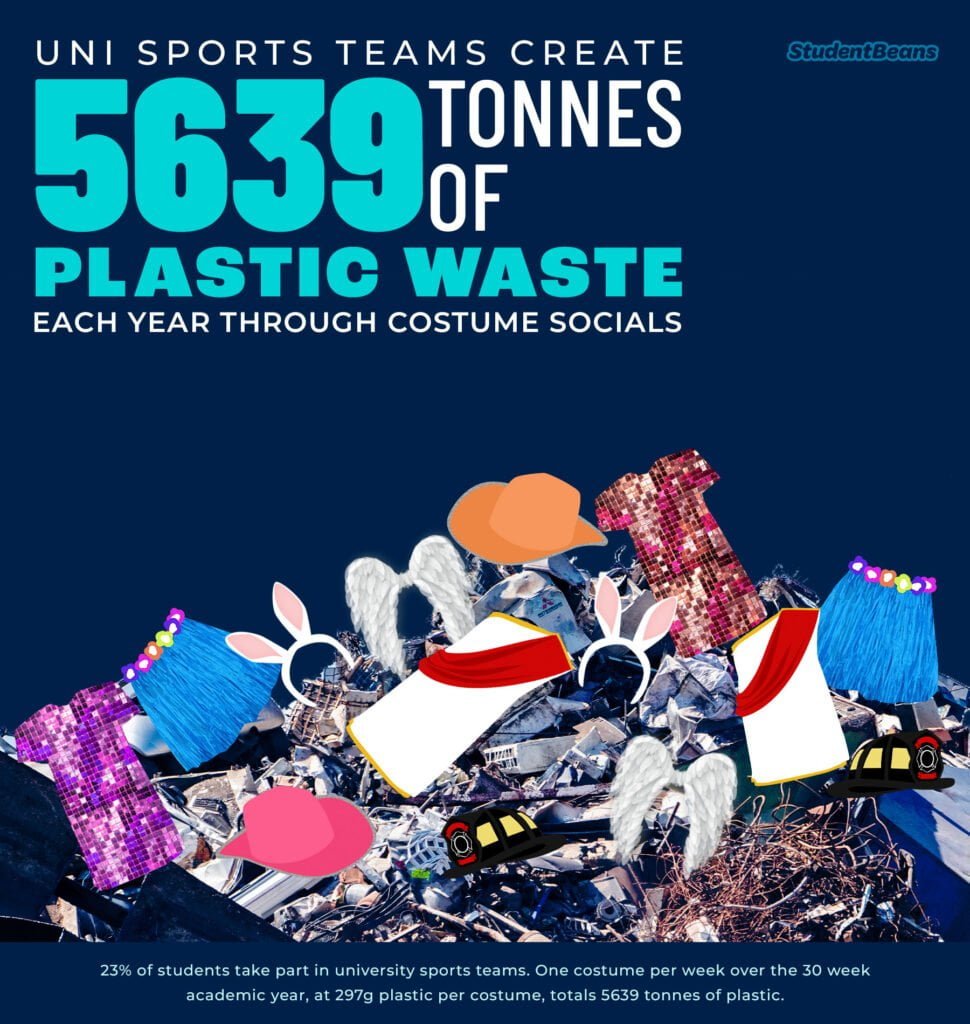Thoughts on the common wastefulness of university societies, with some suggestions aimed at sustainability.
By Illen Rowe, Social Impact Manager at Student Beans
Costume night outs have become a huge part of student culture. From fairy wings to firefighter helmets and everything in between, these costumes are often bought on a whim, worn for the night and then either thrown away or left to languish at the bottom of a cluttered wardrobe.
The clothing industry has become one of the biggest polluters out there, with some estimates that fashion accounts for up to 10% of global carbon dioxide emissions – higher than the emissions from air travel. And fancy dress, by its very nature as a one-off activity, is liable to be an even bigger problem than other areas of fashion if it isn’t practised sustainably.
To keep up with themed socials, it has become the norm for students these days to source last minute costumes from next-day delivery suppliers and fast fashion stores. And although this may not seem so wasteful here and there, this practice could be creating nearly six thousands tonnes of plastic waste each year, new data from Student Beans reveals.
From a survey of 800 university students, we found that 23% of students play in university sports teams, representing approximately 633,000 young people.
Sports teams are often infamously known by students for their weekly costume socials. We calculated that if every student in a sports team bought a new costume each week for a year, that would total 19 million fancy dress costumes. And with the average Amazon costume being made with 297g plastic in it, these costume socials could be catastrophic for the environment.
All those 19 million costumes total a whopping 5,639 tonnes of plastic, the same amount of plastic waste as 226 million bottles of coke per year. The biggest issue here is that plastic can take a very long time to degrade and ends up all over our ecosystem with plastic being recently found everywhere from the deep sea to human blood and even breast milk. Is picking up a new costume worth this risk to the environment, particularly when there are other ways to to prepare for that themed social?



Tips for Sustainable Socials
We spoke to Harriet Noy, the founder of Hazaar – the zero-waste marketplace for students. She agrees that some university practices are posing an increasing risk to the environment. To help university societies become more eco-conscious with their costumes, Harriet gives her top tips for attending or hosting a sustainable social:
Use what you have
The most ideal solution will always be to shop your own wardrobe for a dress-up outfit. You don’t have to have an exact replica of a costume. Instead, you can try and copy the colourways of a costume you want to replicate or be creative and use make-up to elevate the outfit.
Buy second hand
If you’re after a specific costume, there are plenty of buy and sell sites where you can sustainably source an outfit. The Hazaar app even has a section for sports team costumes to make this process easier.
If you have to buy, buy to last
University is an exciting time, and we know sometimes you may need to buy something new to enjoy the experience. If you do need to buy brand new, try and buy something that can be used again, either by yourself or by sharing with your friends and flatmates. Avoid gimmicky 3D costumes that will only really be used once.
Pass on your concerns to the committee
If you feel like your society could do better, let them know! We can only create change through conversation. Talk to them about not encouraging specific costumes that will need to be bought just for one social. You could even suggest they link up with other societies to run a revolving cycle of costume themes, allowing members to share their outfits.
When you’re done, pass it on
Once you’ve finished with a costume, make sure to list it on a buy and sell site or donate it to charity. This will make it easier for other students to socialise sustainably too. Make sure you never resort to binning a costume if you can help it.

The Future of Sustainability in University Societies
There is, of course, a huge amount of pressure to fit in at university and one way may be to join friends in purchasing an exciting last-minute plastic outfit together. But we know that, increasingly, throwaway fashion is being viewed with scepticism by young people. We’ve seen evidence of this with eBay’s popular sponsorship of Love Island this year and the rise in popularity of pre-owned marketplaces like Depop and Vinted. So, soon, it may even turn out that getting a fancy dress outfit second hand is a better way to fit in than buying something mass produced.
And being more sustainable with your love for fashion doesn’t have to cost the earth- it’s about buying less, buying pre-owned and, yes, buying better quality where you can. Buying more sustainably has a reputation for being inaccessibly expensive but this isn’t true. While there are many luxury brands that trade on sustainability as a way to charge through the roof for their products, there are also many accessible brands that are affordable, especially if they are bought less frequently! Brands like Lucy + Yak who use organic fabrics or Rapanui who print in the UK in a renewable energy powered factory, are great examples of brands doing it right,
We know that sustainable shopping can be difficult, which is why we’re making it easier for students to discover their new favourite planet friendly brand through our Sustainable Fashion category on Student Beans.
Through this category, Gen Z can access the best discounts at brands specialising in more sustainable fashion including pre-loved, vintage, and clothing rental. Over time, we hope to roll out these sustainable filters across more of our categories to make sustainable shopping more accessible to conscious young consumers.